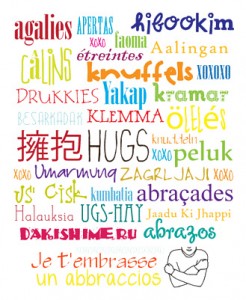Before I say anything about the languages that I speak and teach to my children, let me make it clear that if I don’t have love (i.e. the genuine article, a.k.a. agape in Greek), I am only a resounding gong or a clanging cymbal and who wants to do that for a living? Not me. Not in my home. Not in our homeschooling process.
If that gong and cymbal comparison sounds familiar, it’s because it is. I got it from a gentleman who spoke several languages himself and wrote a dozen small books which have been translated into many, many languages. I am referring, of course, to the Apostle Paul.
Comparing a loveless polyglot to a resounding gong is found in 1 Corinthians 13:1, to be precise. In this chapter, Paul talks about other accomplishments which mean very little in the absence of agape, but he starts out with multilingualism – a detail that has always resonated with me. Pun intended.
Having said all that, I must mention that am fluent in Romanian, French, and English. I have a good knowledge of Swedish, Spanish, Italian, and Latin. And I have basic knowledge of German, Norwegian and Portuguese. Here’s how…
I was born in Romania and lived there until I was 19. I took French in school (two hours a week, grades 5-12). I took English in school (two hours a week, grades 6-12). I also took Latin in the eighth grade. Two foreign languages plus Latin were mandatory subjects in Romania back then – not sure what they do now – but they did not have to be for me.
I have always loved languages and found it easy to learn words and grammar rules. Words to me are like toys to a child. I always want new ones.
I majored in French and English at the University of Bucharest (UB). While there, I took Latin and Ancient French (Ancien Français) classes. It was incredibly helpful to see the evolution of French words from Roman times to the Middle Ages versus today.
Most people do not know that Romanian is a Romance language right along French, Italian, Spanish and Portuguese. We use the Roman alphabet, even though we are surrounded by nations who use the Cyrillic. So yes, I had some home advantage to all this language learning.
I learned Italian by watching Italian movies and TV – if you saw Michele Placido in La Piovra, you would, too – and by listening to Eros Ramazzotti’s music. It occurs to me that I have been a Ramazzotti fan since 1986 – almost three decades. His lyrics are deep poetry.
I learned Spanish on the go, during my lunch breaks in college, preparing for a mission trip to Ecuador in 1995. While there, immersion did the trick.
Swedish and Norwegian come from my three years of living in Sweden – I loved my Scandinavian period, especially the last year, when I lived in Stockholm. You might know this, Swedish vs. Norwegian is like British English vs. American English.
I took German classes here and there, from the TV, from conversation guides, from German friends. Swedish, Norwegian, German and English, of course, fall in the Germanic language family and the similarities help solidify new vocabulary.
Recently, I was watching an interview in Portuguese with English subtitles and I was relying heavily on reading the translation. At one point, I heard the words in Portuguese and the subtitles were delayed. I understood what was said and when the translation popped on the screen, it confirmed it. I tuned my ears and focused more. It was not hard to get it. I was very surprised, but I guess I should not be. Once you have most of the languages in one language family, it’s only a matter of imagination and fine tuning the endings of the words and some grammar rules.
My children are bilingual (Romanian and English) because daddy has always addressed them in English (he is American) and I have always talked to them in Romanian. I am working on adding French and Spanish to their repertoire. I sprinkle Latin here and there throughout the day, when I point out Latin roots of English words and how similar certain words are in many languages (e.g., rapid – English, rapid – Romanian, rápido – Spanish, rapide – French).
If my children went to “regular” school for seven hours a day, I would have very little time to expose them to other languages. That’s one of the big reasons why I chose to homeschool. Time. Time to pursue what we want, after we get basic academic skills out of the way.
For instance, the other day, we had to take a car trip right after breakfast to run an errand. We did our calendar and foreign language activities in the car. We said the days of the week and the months of the year in English, Romanian and French. Then, we counted to 20 in all three languages. I have written briefly about car schooling before.
That’s just another reason why I like homeschooling: learning happens everywhere you go, while you run errands and live your life together as a family, even when you are away from a desk. I linked to


